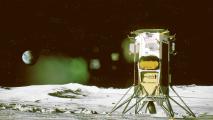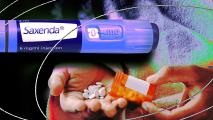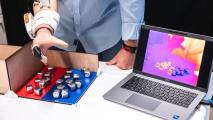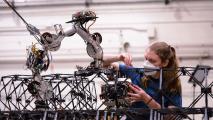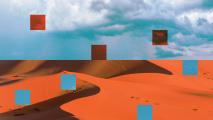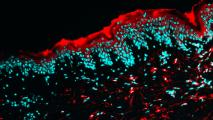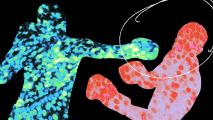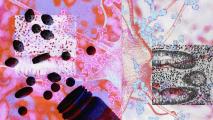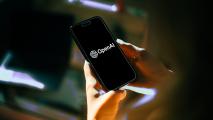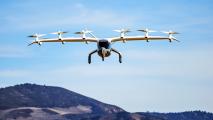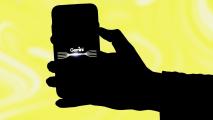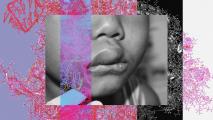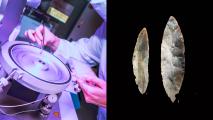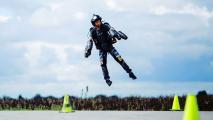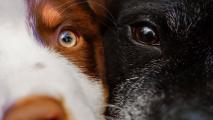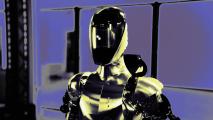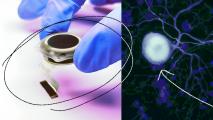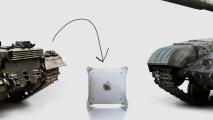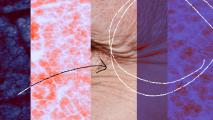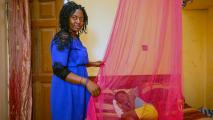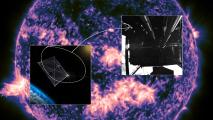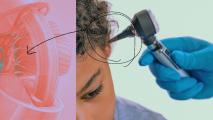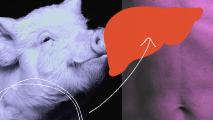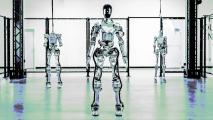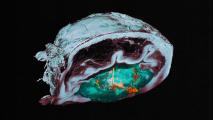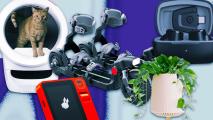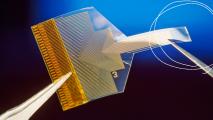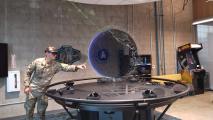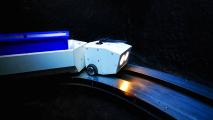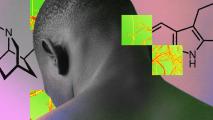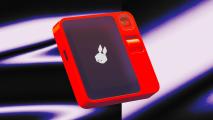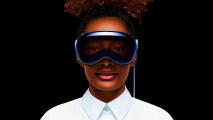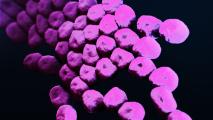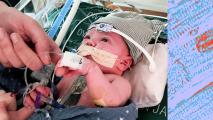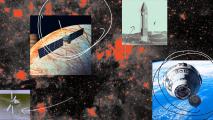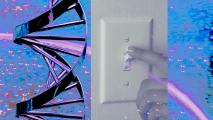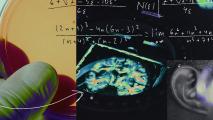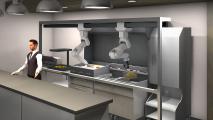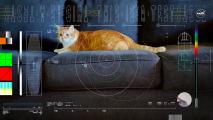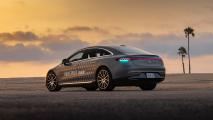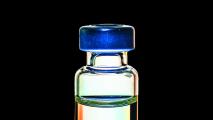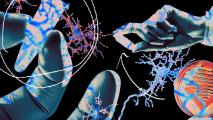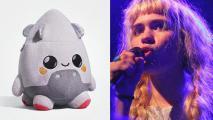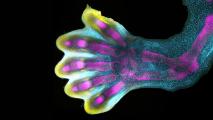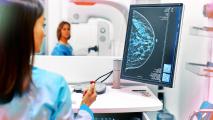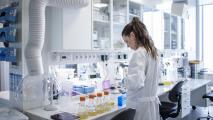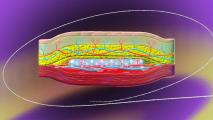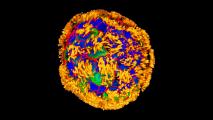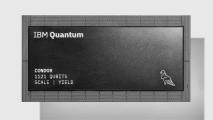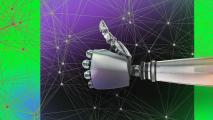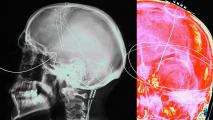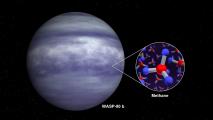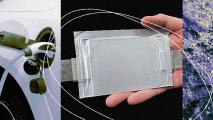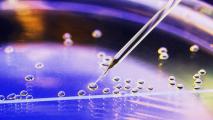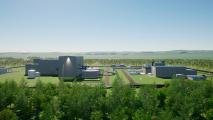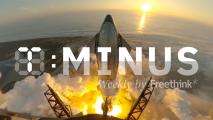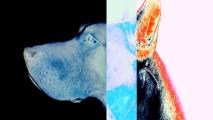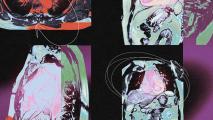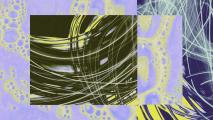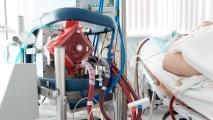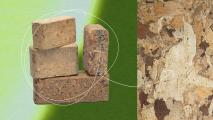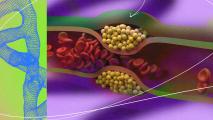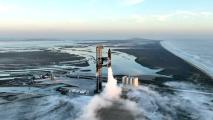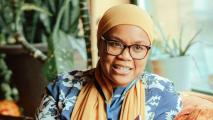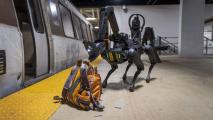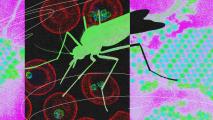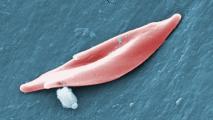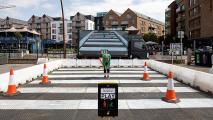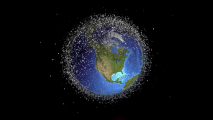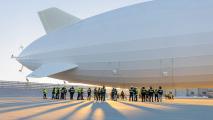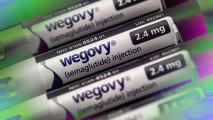Status: Featured
To promote content in various display modules across the site
OpenBCI’s new VR headset reacts to your brain and body
OpenBCI is reshaping the relationship between humans and the virtual world with Galea Beta, a headset that measures the body and brain.
US startup makes history with stressful, landmark moon landing
Intuitive Machines just made history with the first private moon landing — and the mission was a nailbiter.
T-Minus: Water discovered on asteroids, first space factory comes home, and more
Freethink's weekly countdown of the biggest space news, featuring the return of Varda's space factory, a Russian space weapon, and more.
Weight-loss drug reduces cravings for opioids in small study
A first-of-its-kind trial found that GLP-1 agonists, a popular kind of weight-loss drug, could help people overcome their opioid cravings.
Man feels hot and cold again with prosthetic hand breakthrough
Researchers have built a device that helps users feel temperature through a prosthetic arm. A new study shows it works with high accuracy.
NASA tests autonomous space robots for off-world construction
NASA is developing autonomous space robots to build shelters, solar arrays, and more on the moon and Mars.
Mega solar farms could make it rain in deserts
A new study suggests that gigantic solar farms could be used to create “heat islands” that make rain locally.
OpenAI’s text-to-video AI, Sora, is futurism come to life
Sora will let anyone transform their ideas directly into video and the implications are breathtaking.
Why Apple won’t call the Vision Pro “virtual reality”
Apple has forbidden developers from using "VR," "AR," or "MR" to describe their Vision Pro apps. That’s a mistake.
T-Minus: SpaceX launches PACE, new ocean moon discovered, and more
Freethink's weekly countdown of the biggest space news, featuring the launch of PACE, the discovery of Mimas' ocean, and more.
Bioluminescent plants don’t exist in nature — but you can buy one for $29
Biotech firm Light Bio is selling gene-edited bioluminescent plants that glow green in the dark for just $29.
New pharma supergroup aims to tackle skin disorders
Six biotech companies just merged to form Alys Pharmaceuticals with the goal of developing new treatments for skin disorders.
Scientists stole a mutation from cancer and used it to kill tumors
Inserting a mutation found in cancer cells into CAR-T cells enabled them to kill a variety of solid tumors in mice.
How to stop our immune systems from turning on us
From "inverse vaccines" to repurposed cancer therapies, several potential cures for autoimmune diseases are showing serious promise.
OpenAI is developing “AI agents.” Here’s what that means.
OpenAI is reportedly developing “AI agents,” software that can perform tasks on people’s devices upon request.
Archer’s flying taxi finishes first round of flight tests
Archer Aviation’s electric air taxi has completed its first phase of flight testing, bringing the eVTOL one step closer to commercial service.
Fusion reactor break world record in final experiment
The JET tokamak set a new world record for generating energy from nuclear fusion during its final experiment.
T-Minus: Guardians in space, a new (off) world record, and more
Freethink's weekly countdown of the biggest space news, featuring the first Guardian in space, an extended private mission, and more
Google’s Gemini Ultra AI has been released
Google just made its most capable generative AI — Gemini Ultra — available to the public, while killing the “Bard” brand.
One-shot CRISPR treatment for inherited disease aces first human trial
A CRISPR treatment for hereditary angioedema significantly reduced swelling attacks in its first human trial.
Arc Search aims to revolutionize browsing, AI, and search, all at once
Searching isn’t what it used to be, and chatbots can be clunky — will the Browser Company's Arc Search app replace both?
New DNA testing reveals who made ancient stone tools
Using modern DNA analysis techniques, archaeologists have solved the mystery of who made a class of ancient stone tools.
How to train your self-driving car
From loading the car with sensors to teaching its AI to “think” like a human driver, there's more than one way to train an autonomous car.
First jet suit race is less than a month away
During the world’s first jet suit race, eight competitors will take flight over the water off the coast of Dubai.
Anti-aging pill for senior dogs is now in clinical trials
An anti-aging pill for senior dogs now in clinical trials might lead to treatments that extend human lives, too.
T-Minus: The Mars helicopter’s final flight, a moon lander’s reawakening, and more
Freethink's weekly countdown of the biggest space news, featuring Ingenuity's final flight on Mars, SLIM's revival, and more.
OpenAI is reportedly investing in humanoid robots
Microsoft and OpenAI reportedly plan to invest $100 million into Figure, a startup developing a humanoid robot for the workplace.
Elon Musk’s Neuralink has implanted its first device in a human being
Now that Neuralink has implanted a device in a person, CEO Elon Musk is closer to his goal of making brain chips common in the future.
When the Mac was a “munition”
Macs were once deemed a threat to national security. Will today’s AI rules seem similarly outdated when we look back on them?
One-and-done anti-aging treatment “rejuvenates” old mice
CAR-T cells that have been modified to target senescent cells could be a one-and-done anti-aging treatment.
World’s first malaria vaccination campaign launches in Cameroon
Cameroon has launched the world’s first malaria vaccine program — a huge milestone on the path to a malaria-free future.
NASA lays out the path to space-based solar power
A NASA study found that space-based solar power is likely far too expensive, but it also details what would need to happen to make it work.
T-Minus: NASA cracks asteroid capsule, Japan joins exclusive moon club, and more
Freethink's weekly countdown of the biggest space news, featuring Japan's moon landing, NASA's asteroid sample, and more.
Deaf boy hears within days of receiving new gene therapy
A gene therapy designed to treat a rare form of genetic deafness has restored hearing in the first patient to receive it.
UK’s “DragonFire” laser weapon downs its first drones
The UK’s high-powered DragonFire laser weapon just shot down its first drones — bringing it one step closer to the battlefield.
DeepMind’s AI could accelerate drug discovery
A new study suggests that AlphaFold, DeepMind’s AI tool for predicting protein structures, could be useful for drug discovery after all.
Pig liver filters blood outside a person’s body for 72 hours
A gene-edited pig liver that filtered the blood of a person who was brain dead for 72 hours could one day help people with liver failure.
See the humanoid robots that will build new BMWs
General purpose robots developed by robotics startup Figure are going to be deployed at a BMW Manufacturing plant.
Urine-propelled nanobots shrink bladder tumors by 90% in animals
Tiny, radioactive nanobots propelled by urine shrank bladder tumors by 90% in mice, suggesting a new way to target the disease.
10 must-see technologies from CES 2024
From super-hyped AI assistants to apps that translate babies’ cries, CES 2024 has given us a glimpse at the tech of tomorrow, today.
T-Minus: NASA’s Artemis update, a rocket’s maiden flight, and more
Freethink's weekly countdown of the biggest space news, featuring NASA's Artemis update, the maiden launch of Vulcan Centaur, and more.
New graphene semiconductor could revolutionize electronics
The first working graphene semiconductor outperformed silicon, suggesting that the supermaterial could be the future of electronics.
This “supermaterial” created a transparent brain implant
An AI-powered transparent brain implant made of the supermaterial graphene can predict activity below the brain’s surface.
Space Force pays Microsoft $20 million for a space simulator
Microsoft is building an advanced space simulator for the US Space Force so that its members can train in VR.
Autonomous tech is taking over last-mile delivery
Autonomous robots, drones, and even underground tunnels could be the standard for last-mile delivery in the future.
Psychoactive drug ibogaine helps veterans with TBI
A small study found that one dose of ibogaine could reduce the symptoms of a traumatic brain injury (TBI) for military vets.
T-Minus: SpaceX’s direct-to-cell satellites, XRISM’s first images, and more
Freethink's weekly countdown of the biggest space news, featuring SpaceX's direct-to-cell satellite launch, XRISM's first images, and more.
AI startup Rabbit’s R1 device sells out in 24 hours
Tech startup Rabbit has unveiled R1, an AI-powered consumer device designed to free you from app overload.
Apple’s $3500 mixed reality headset hits stores February 2
Apple has announced a February 2, 2024, release date for its highly anticipated mixed reality headset, Vision Pro.
Superbug-killing antibiotic is now in human trials
A promising new antibiotic that kills a superbug resistant to nearly all available drugs is now being tested in people.
Toddler thriving after world’s first partial heart transplant
A toddler born with faulty heart valves is thriving nearly two years after undergoing the world’s first partial heart transplant.
The 21 most exciting space missions of 2024
2024 is expected to deliver huge wins for the space industry, including 10 moon missions, more Starship launches, and a historic sun swoop.
New on/off switch in mRNA lets doctors “tune” gene therapy
A new kind of mRNA switch could give doctors the ability to precisely control the expression of therapeutic genes.
T-Minus: SpaceX’s spaceplane launch, Jupiter’s “pizza moon,” and more
Freethink's weekly countdown of the biggest space news, featuring SpaceX's spaceplane launch, a new image of Io, and more.
Cyborg computer combining AI and human brain cells really works
A new biohybrid computer combining a “brain organoid” and a traditional AI was able to perform speech recognition.
AI robots are making burgers and fries at this new restaurant
The AI robots making burgers and fries at CaliExpress could help the restaurant industry address its persistent labor shortage.
NASA beams home cat video from 19 million miles away
In a history-making demonstration, NASA used invisible lasers to send a cat video to Earth from deep space.
Mercedes-Benz adds special blue lights when its self-driving cars are “on”
Mercedes-Benz has added turquoise lights to its self-driving vehicles to indicate when its autonomous driving system is engaged.
This startup wants to track soil carbon with AI and satellites
Boomitra’s remote sensing technology combines data from Earth and space to verify when carbon is coming out of the air.
Microsoft is training an AI to help get nuclear reactors approved
Microsoft is training an AI to generate the paperwork needed to get next-gen nuclear reactors approved by regulators.
Moderna’s mRNA cancer vaccine works even better than thought
Adding Moderna’s mRNA cancer vaccine to a standard melanoma treatment dramatically reduces the risk of death or recurrence.
The 5 most exciting clinical trial results of 2023
In 2023, several potentially game-changing meds, including ones to treat pain and high cholesterol, showed huge promise in human trials.
T-Minus: Counting down the 10 greatest space stories of 2023
Freethink's countdown of the biggest space news of 2023, featuring major rocket launches, groundbreaking astronomy discoveries, and more.
How can we transform the mental health care system for today’s youth?
In partnership with UNICEF
The mental wellbeing of children and young people is at the forefront of mind - and UNICEF and partners have a design plan to strengthen healthcare systems to meet the demand.
The AI behind ChatGPT is bringing this toy to life
Pop artist Grimes and Silicon Valley startup Curio have created an AI toy that can understand and talk to kids.
Stunning video reveals how our fingers form in the womb
A first-of-its-kind map of human limb development could help prevent a common type of birth defect in the future.
Walmart now has mammograms, analyzed with AI
Shoppers can now get mammograms at a Walmart in Delaware — and more of the walk-in clinics are set to open in 2024.
World’s first “self-amplifying” vaccine approved in Japan
The approval of the first saRNA vaccine could signal a new era in how we prevent and treat everything from infections to cancer.
T-Minus: Missing space tomato found, a stellar remnant revealed, and more
Freethink's weekly countdown of the biggest space news, featuring NASA's missing space tomato, Webb's new stellar remnant image, and more.
Experimental implant could end the need for insulin injections
An arm implant containing islet cells could one day make it far easier for people with type 1 diabetes to manage their disease.
Tiny biobots surprise their creators by healing wound
Tiny “biobots” made from human windpipe cells, amazingly, helped damaged neural tissue to repair itself in a new study.
IBM unveils world’s largest quantum chip
Tech giant IBM is pushing the field of quantum computing forward with Condor, the world's largest quantum chip.
Suckup software: How sycophancy threatens the future of AI
The biggest problem with AI right now might not be it defying humans but bending its answers to make us happy.
This startup is solving the biggest problem to creating drugs that work
Lab-grown human tissues could revolutionize drug development. This AI-powered robot can create and test 10,000 of them at once.
T-Minus: A river of stars, NASA’s next moon landing, and more
Freethink's weekly countdown of the biggest space news, featuring a newly discovered stellar stream, NASA's next moon mission, and more.
Zapping injured brains can improve cognition and memory
The lasting symptoms of a traumatic brain injury (TBI) can be treated with deep brain stimulation, according to a first-of-its kind trial.
NASA’s Webb telescope finds methane in far-off “warm Jupiter”
Astronomers have spotted methane — a molecule linked to the presence of life — in the atmosphere of a “warm Jupiter” exoplanet.
Toshiba unveils new fast-charging, cobalt-free battery
Toshiba has developed a new kind of cobalt-free battery that could lead to cheaper, more sustainable EVs in the future.
Stem cell injections could be the key to curing MS
From promising stem cell therapies to EBV vaccines, researchers are closer than ever to finding a cure for MS.
How TerraPower is leading the nuclear renaissance
Bill Gates’ TerraPower startup is building a next-generation nuclear power plant that could revive the declining industry.
T-Minus: Starship’s big flight, an alien-hunter’s gift, and more
Freethink's weekly countdown of the biggest space news, featuring Starship's second test flight, a new "dark mysteries" telescope, and more.
Biggest science prize in history aims to extend human healthspan by a decade
Do humans have an ethical obligation to “die young”? Maybe not in the way you think, says bioethicist Raiany Romanni.
First anti-aging drug for dogs nears approval
The FDA is a major step closer to approving biotech company Loyal's LOY-001, the first anti-aging drug for dogs.
Experimental drug cuts heart disease risk factor by 96%
Eli Lilly’s experimental drug lepodisiran reduced blood levels of lipoprotein(a) by up to 96% in a small trial.
Soap bubble discovery could lead to better EV batteries
A connection between soap bubbles and lithium-metal batteries could get them out of the lab and into our electric vehicles (EVs).
GPT-4 is able to buy stuff on Amazon, researchers say
AI researchers successfully trained a GPT-4-based agent, dubbed the MM-Navigator, to “buy” products on Amazon.
A new machine is able to keep the brain alive without a heart
A new device that lets scientists precisely control the brain's blood supply could lead to new neuroscience breakthroughs.
How these wooden blocks could stop climate change
Bill Gates-backed startup Graphyte has unveiled Carbon Casting, carbon removal tech it says is cheap, scalable, and durable.
One dose CRISPR therapy cuts cholesterol by up to 55%
A CRISPR-based cholesterol treatment reduced “bad” cholesterol levels by up to 55% in a small first trial.
Elon Musk’s SpaceX Starship enters space for the first time
SpaceX’s Starship — the world’s biggest rocket — reached space on its second attempt, but the test wasn’t a complete success.
This group is investing in Muslim communities to shift harmful perceptions
In partnership with Skoll Foundation
“We belong here. We always have.” Meet the people behind Pillars, the program investing in the lives and dreams of American Muslims.
Robot police dog helps end standoff in LA
The LAPD used its controversial robot police dog to deescalate a standoff with an armed man on a public bus.
World’s first chikungunya vaccine approved in US
The FDA has just approved French biotech company Valneva’s Ixchiq, making it the world’s first chikungunya vaccine.
World’s first CRISPR therapy approved in UK
UK regulators have authorized CRISPR Therapeutics’ Casgevy, making it the world’s first approved CRISPR therapy.
You win this street game by getting “hit” by a self-driving car
A game that challenges pedestrians to avoid detection by an AI could help train tomorrow’s self-driving cars.
One company you’ve never heard of is helping avoid space catastrophes
LeoLabs uses advanced algorithms, cloud computing tech, and a global network of ground-based radars to track objects in low-Earth orbit.
Biggest aircraft since the Hindenburg cleared for test flights
Pathfinder-1, a massive airship developed by Google cofounder Sergey Brin’s LTA Research, has begun flight testing.
Wegovy slashes heart attack risk by 28%
Novo Nordisk’s weight-loss drug Wegovy can reduce a person’s risk of a serious cardiovascular event by 20%.
Aussie scientists hit milestone in concentrated solar power
A breakthrough at a concentrated solar power facility in Australia could help make solar a more reliable source of energy in the future.
Analog computing is undergoing a resurgence
Combining smart sensors with an older technology — analog computing — could dramatically reduce their power consumption.

